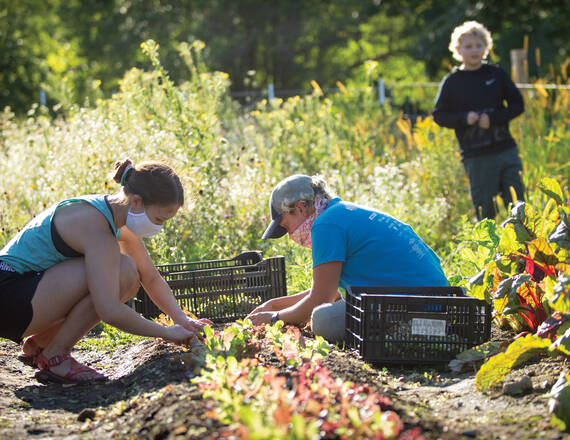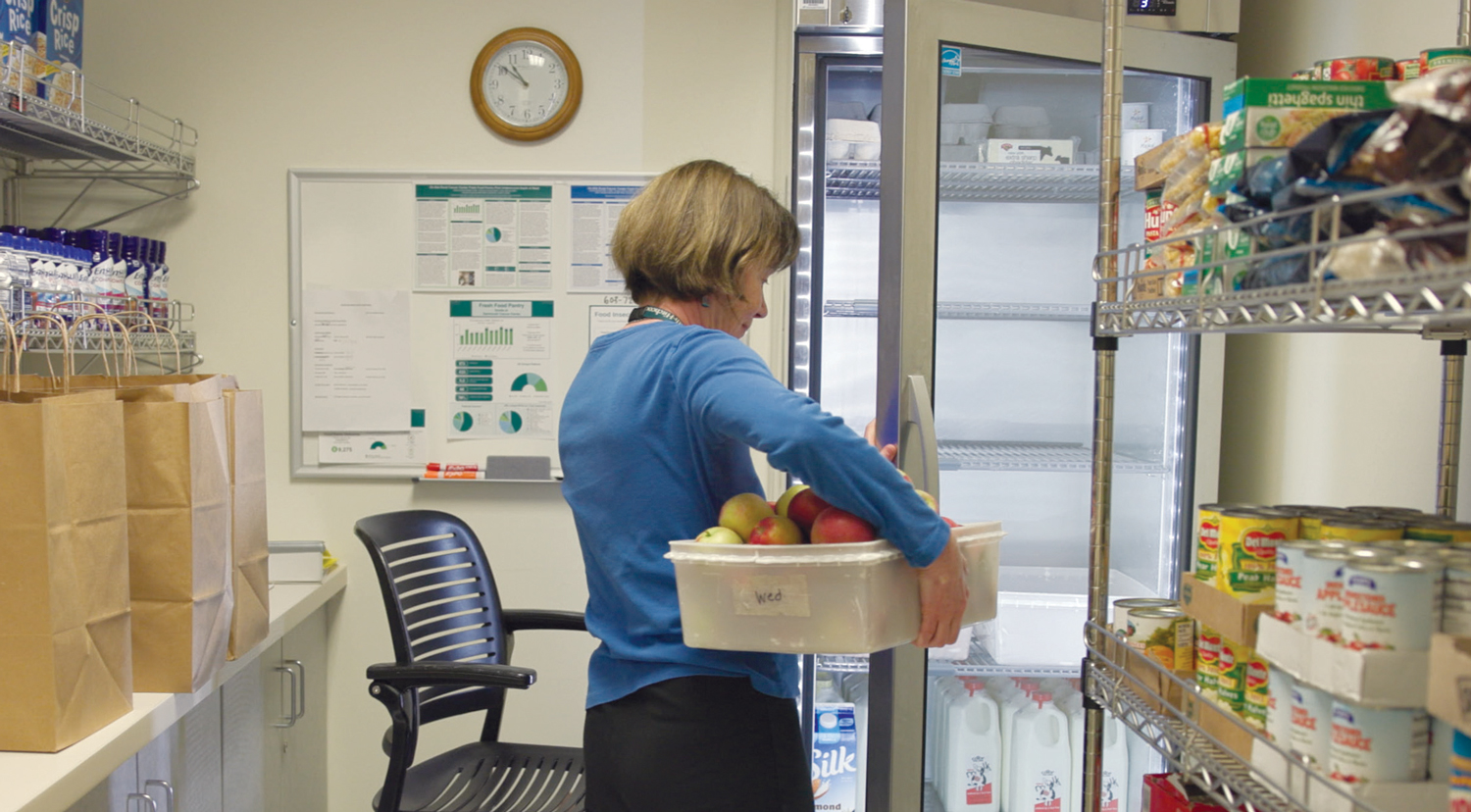Food is Medicine: Programs Target Food Insecurity Among Patients
If you’ve passed by the Dartmouth Cancer Center recently, you might have seen oncology dietician Dianne Kelecy, MS, RD, LD, pulling a little red wagon full of groceries through the parking lot.

Food insecurity affected 17 million households at some time during 2022, according to the United States Department of Agriculture. These house- holds struggle with reliable transportation, access to fresh and nutritious ingredients, and significant financial burdens.
In 2022, staff members at the Cancer Center noticed that many patients coming through the Dartmouth Cancer Center’s doors face these same challenges—and they decided to do something about it. The result was the Dartmouth Cancer Center Food Pantry, which aims to make enriching food the priority for patients as they face one of the biggest fights of their lives.
“We’ve seen cancer patients choose between their care and food,” says Deborah Scribner, MBA, senior director of oncology services at the Cancer Center. Cancer treatment can leave patients with little energy to grocery shop, cook, or find a food pantry in their community. It also can take a financial toll. “We wanted to help patients receive both the care and the food they need to support their recovery.”
The early success of the Cancer Center Food Pantry is now serving as a model of what is possible, as teams across Dartmouth Health are developing a network of programs to alleviate the challenges of food insecurity among patients and their families.
The Food Pantry Begins
Nearly 22 percent of Dartmouth Cancer Center patients are food insecure—a significant number underscored by the importance of nutrition during cancer treatments.
The food pantry launched in February 2022 as a pilot program to alleviate the challenges patients can face in obtaining enriching food by offering one-stop cancer care. In the first 11 months, the project provided more than 150 patients and their families with groceries every two weeks.
Through the food pantry, patients can get nutritious, custom grocery packages directly from the Dartmouth Cancer Center. Kelecy, who leads the food pantry operations, will speak directly with a patient about their grocery needs. She then assembles bags of food and loads them into a little red wagon, which she pulls directly to the patient’s waiting vehicle.

In its early stages, the food pantry was supported by small grants from Dartmouth Health, and a few lead donors helped it progress. Now, the program relies entirely on philanthropic support.
Since the beginning of 2023, the pantry has delivered an additional 1,700 grocery bags to about 400 patients. The significant number of patients who utilized the program during its pilot period inspired the Cancer Center to expand the food pantry, and efforts are already underway. In the meantime, the food pantry continues to provide fresh, organic produce to patients, and shows no signs of slowing down.
Many Kinds of Food Insecurity
Food insecurity is not a one-size-fits-all problem. For example, a patient who does not have reliable transportation to the nearest grocery store is considered food insecure, as would be a patient who does not have enough nutritious meals to eat every day. All patients are screened for food insecurity via questions on patient intake forms that they complete prior to their visit with a physician. Resource specialists and community health workers may also conduct home visits and see that somebody does not have access to specific meals or tools. These patients are then referred to staff at the appropriate program.
“When we talk about food insecurity, there’s a tendency to think that people may not have enough food in general, but the definition of food insecurity is much more encompassing,” says Chelsey Canavan, MSPH, who manages Dartmouth Health’s Center for Advancing Rural Health Equity. “I prefer the term ‘nutrition insecurity.’ What we are doing is looking at not just having enough food, but we are determining if people have access to the food that is giving them the nutrients they need through their treatment.”
One critical reason there is food insecurity among patients at Dartmouth Health is because the community being served is very rural, explains Canavan.
“Nationally, rural communities are more likely to experience food insecurity,” she says. “There are so many food deserts in these communities. The nearest grocery store could be 45 minutes away, and not all families have access to reliable transportation to get there.”
Inspired Initiatives
To help combat this, the Center for Advancing Rural Health Equity has piloted other programs through different departments at Dartmouth Health. The Food Prescription Program, for instance, is tailored to the specific health needs of those with diabetes, pre-diabetes, and celiac disease. Additionally, there is also the Medically Tailored Meals Program, which provides prepared meals customized to meet the needs of congestive heart failure patients. The center is also planning to introduce a program for pregnant and postpartum patients who may not have access to kitchen equipment or other necessities to prepare meals.
The early success of these programs has been made possible by donations, volunteers, and partnerships with local nonprofit organizations, like the Upper Valley Haven, which provides temporary shelter for families experiencing homelessness. For example, the nonprofit has helped stock the Cancer Center Food Pantry with healthy, shelf-stable food, organic produce, and dairy and non-dairy groceries.
When we talk about food insecurity, there’s a tendency to think that people may not have enough food in general, but the definition of food insecurity is much more encompassing.”
—Chelsey Canavan, MSPH, Manager of Dartmouth Health’s Center for Advancing Rural Health Equity
“A lot of what we have done is create unique community partnerships to address rural health needs and the unique needs of different patients,” says Canavan. “The variety of programs helps us address the different nutritional needs of all our patients.”
A network of volunteers, called Willing Hands, also operates a year-round garden on the Dartmouth Hitchcock Medical Center campus in collaboration with Canavan and her team. The Willing Hands Farmacy Garden, which grows around 1,200 pounds of produce every year, provides nourishment for patients across Dartmouth Health by distributing nutritious fruits and vegetables with help from volunteers in the community.
The Cancer Center Food Pantry is the model Canavan hopes to replicate across the other pilot programs. A grand goal, she adds, would be to unify these initiatives under one program to ensure that all patients have access to the food supplies they need.
“We really need to centralize on-site locations so that there is equitable access for how our patients get access to food throughout the entire system,” she says. “We would also want to standardize the pilot programs to make sure that everyone is being screened on the same basis and nobody is falling between the cracks depending on their specific condition or who they speak to at the clinic. The more we can standardize the process and the programs, the better we can serve patients. That is where I would like to see us go.
“We need a program that is large enough to serve everyone,” Canavan says.
To learn more about the work being done to combat food insecurity at the Dartmouth Cancer Center Food Pantry, contact Erin Shreve at Erin.Shreve@hitchcock.org or 603-646-5878, or go to foodpantry.friendsfightingcancer.org.